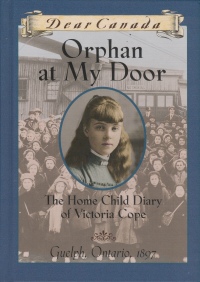| ________________
CM . . . . Volume XVIII Number 6 . . . . October 7, 2011
excerpt:
When Victoria Cope's mother gets pregnant and needs help, the family decides to take on a Home Child, an orphan sent from England to go into service. Victoria's diary chronicles the way their family is transformed by accepting Marianna Wilson into their home. Victoria is not sure how to feel about her, especially since many people, including her older brother David, think Home Children are inferior and not to be trusted. But Victoria slowly becomes friends with the orphan girl. Little things, like Victoria's learning how to spell and say Marianna's name correctly, symbolize the increasing respect and trust between the girls. Marianna confides that she was separated from her younger brother and sister after they came to Canada, and Victoria wants to help reunite the siblings. The girls find out that Marianna's brother was sent to a cruel man who starves and beats him, and they do everything they can to help him escape. Victoria's first person narration is immediate and engaging, and the diary itself becomes an important part of the story. Victoria often stops in the middle of a scene because her mother is calling her or she is too tired to keep writing. She loses her diary a few times and has to write on loose sheets; once Marianna steals the diary and writes a response to something Victoria wrote. Victoria's descriptions of everyday life, both in what she describes (lemon snow pudding, for example) and what she takes for granted, bring turn-of-the-century Ontario to life. The strengths of Orphan at My Door are the characters and their relationships. Every member of Victoria's family is real and well-rounded, and their characters are revealed and developed through their responses to Marianna. David is embarrassed to have a Home Child, and later betrays Marianna, but he has a change of heart when he sees the consequences of what he has done. Younger than David, Tom sticks up for Marianna and helps her hide her little brother Jasper. Victoria's fumbling kindness breaks through Marianna's reserve, and their developing friendship is the emotional core of the story. Comic relief is provided by the awful Great Aunt Lib and Cousin Anna who arrive uninvited for an extended stay. But even these characters have their moments of transformation. Victoria's mother and father are the moral centre of the family, but their interactions with Lib and Anna make them human. Jean Little vividly portrays a loving family dealing realistically with challenges, some specific to the time, and some universal. Orphan at My Door explores friendship, trust, compassion, prejudice, and responsibility through the eyes of a perceptive and sensitive 11-year-old. The book is eloquently written, expertly paced, and emotionally resonant. The "Dear Diary" series is designed to make Canadian history appealing to young readers with beautiful books written by well-known authors, and Orphan at my Door more than fulfills that mandate. It is well-researched and provides an intimate yet balanced perspective on a little-known chapter of history. At the end, there are 16 pages of information about Dr. Barnardo and the Home Children, including pictures, maps and recipes, some of it based on Jean Little's personal and familial experience with Home Children. Most importantly, Orphan at My Door is an excellent and enjoyable story. Highly Recommended. Kim Aippersbach is a free-lance editor and writer and mother of three in Vancouver, BC.
To comment
on this title or this review, send mail to cm@umanitoba.ca.
Copyright © the Manitoba Library Association. Reproduction for personal
use is permitted only if this copyright notice is maintained. Any
other reproduction is prohibited without permission.
NEXT REVIEW |
TABLE OF CONTENTS FOR THIS ISSUE
- October 7, 2011.
AUTHORS |
TITLES |
MEDIA REVIEWS |
PROFILES |
BACK ISSUES |
SEARCH |
CMARCHIVE |
HOME |
